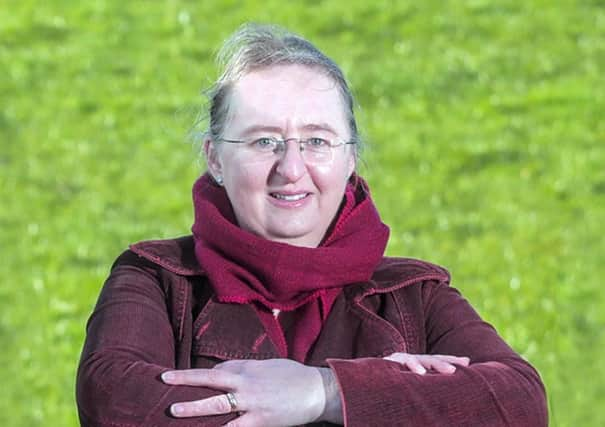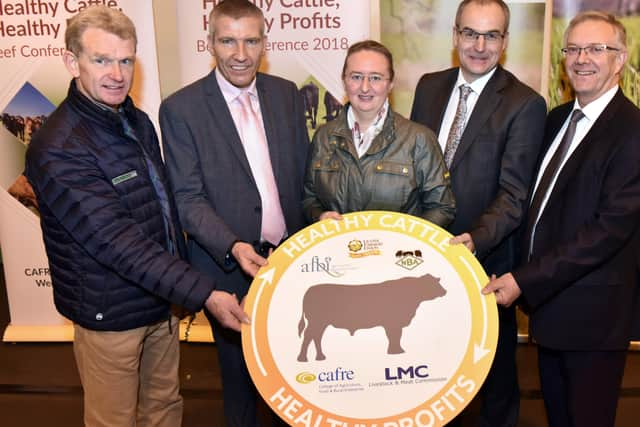‘Farming and research have always been in my blood’


And staff at the Agri-Food and Biosciences Institute (AFBI) will be leading the way in this regard.
No better time, then, for Farming Life’s Richard Halleron to have a ‘virtual coffee’ with the lady that has been charged with the job of making sure this work gets over the line - Dr Elizabeth Magowan.
Advertisement
Advertisement
Earlier this week, AFBI’s Director of Sustainable Agri-Food Sciences Division and mother of two young children gave up some of her valuable time to discuss her background, upbringing, her interest in science and the opportunities that now exist to develop a farming industry in Northern Ireland that is fit for purpose - in every sense.


Richard started by asking Elizabeth about her early years.
“I was born on a family farm between Newry and Banbridge. We kept a mix of beef cattle, sheep and pigs. My father also grew a range of crops, including cereals and potatoes. I was the eldest of four children: I have two sisters and a brother. From quite an early age, I recognised that the farm was quite a big operation, in the context of the industry here in Northern Ireland
“I loved working with the animals and had the desire to farm myself from a very early age. As it turned out, my career took me in another direction. However, I have the consolation of living on a small holding today. Unfortunately, my father died in a farm accident back in 2012. This event had a major bearing on how the family business was subsequently managed.”
Did you enjoy school?
“I attended Windsor Hill Primary School in Newry and enjoyed most of it as the farm was always the main attraction for me! Next up was Banbridge Academy. Prior to sitting my ‘A’ Levels, I had planned on becoming a vet. Unfortunately, I didn’t get the grades to get into vet school, so the choice was made to enrol at Queen’s University Belfast, where I completed my first degree in Biochemistry and then followed that up with a degree in Agricultural Science.
Advertisement
Advertisement
“Looking back on it all, though, I would have done it all a bit differently. I should have re-sat my exams and made the push again for vet school the following year.
“The advice I would give up to any young student. Never give up. Determination pays off. Mind you, had I qualified as a vet, more than likely I would have gone down the research path anyway.”
So was getting involved in research always a big driver for you?
“Absolutely! My degrees gave me the research bug and on completing my agriculture degree, I was accepted to study for a PhD on the back of a Department of Agriculture scholarship at the then Agricultural Research Institute of Northern Ireland, or ARINI.
Advertisement
Advertisement
“The research involved me identifying the ‘do’s and don’t’s’ when it came to successfully producing ‘spreadable butter’. I couldn’t have asked for a better project to be working on. There was a very strong farm element and, in addition, the required laboratory dimension to the work. Tying in with all of this I also had the opportunity of liaising with staff at Dale Farm, who were driving the commercial aspects of the project.”
Elizabeth completed her doctoral studies in 2004, the same year that also saw her get married. Prior to this, in 2003 she was appointed to the research team at ARINI, where she joined the organisation’s pig production research group.
AFBI was established in 2006 at which time Elizabeth was increasingly leading on taking forward the organisation’s pig research programme. Over the years, her work focussed on optimising pig production performance through management and nutritional strategies whilst reducing environmental impact. Elizabeth also worked extensively on industry/academic collaborative studies and presented her work across the UK and at international conferences. In 2017 she won the Hammond award from the British Society of Animal Science in recognition of her work on research impacting on industry. In May 2017 she took up her current role, as Director of Sustainable Agri-Food Sciences Division.
Richard asked Elizabeth if she found the transition from ARINI to AFBI a hard one to make.
Advertisement
Advertisement
“We are talking about two different organisations. ARINI had its own board of directors with budgets set accordingly. The same is also true of AFBI. However, AFBI can deliver a much more holistic approach to research.
“Back in the day, the work undertaken at ARINI was very much focussed on production related issues. However, the scope of AFBI is such that a specific issue can be addressed from a production, economic and environmental through to health and food quality perspective under the one organisation.
“This makes the work more relevant. It also means that we can deliver much more meaningful results in a holistic manner for the farming and food sectors here in Northern Ireland.”
How is AFBI addressing the challenges of sustainability and climate change on behalf of local agriculture?
Advertisement
Advertisement
“Currently my main areas of focus are on finding ways to reduce ammonia production levels on farms and identifying the ways by which the Carbon Footprint of our farming sectors can be reduced.
“Ammonia is a local problem, basically when produced it is dispersed in the air but most of it falls back down again within 7-10 km and with Northern Ireland having a rich landscape scattered with sensitive habitats it causes issues across the vast majority of NI through polluting these sensitive habitats. In contrast, the challenge of reducing our Carbon Footprint is international in nature and therefore a slightly different approach is needed.
“In the first instance we are monitoring ammonia emissions under DAERA funded projects. In addition AFBI is tackling the problem from a number of perspectives. One of these is centred on the reduction of protein levels in animal diets.
“The principle is a simple one: the less nitrogen that an animal takes in, the lower is its potential to reduce ammonia. This work is showing significant potential but care must also be taken not to impact the performance of the animals.
Advertisement
Advertisement
“Where Carbon Footprint is concerned, the reality is that all ruminant animals produce methane. This is an important greenhouse gas.
“Improving the efficiency of our production systems in tandem with the use of additives and technologies specifically designed to reduce the level of enteric methane production and capture carbon may well get us a very long way towards achieving carbon neutrality for farming.
“However, the UK has set out a target of achieving a Net Zero Carbon status for the country as a whole by 2050. Ruminant agriculture will play a part in making this a reality. But, at the end of the day, the overall target will only be met on the back of a combined effort made by all sectors of industry and the public at large.”
Does agriculture get sufficient recognition for the levels of carbon it actually sequesters?
Advertisement
Advertisement
“We do know that soils actively sequester carbon over many years. A long term slurry trial at AFBI Hillsborough has produced results to this effect for the past 40 years. But we need to know if these results are site specific or is this a trend that can be generalised for farming in Northern Ireland as a whole? Ongoing AFBI trials are striving to find out the answer to this question right now.
“The reality is that farmland does actively sequester carbon. And it behoves everyone working within agriculture to profile this fundamental reality whenever possible.”
Richard then asked Elizabeth about the other research and development organisations that AFBI partners with.
“We have very close ties with both CAFRE and Queen’s University Belfast. AFBI personnel have worked on a collaborative basis with CAFRE staff over many years and this relationship will be built on further during the period ahead.
Advertisement
Advertisement
“In 2018 AFBI announced the formation of a strategic alliance with Queen’s University. This alliance is developing well and will enable the further pooling of expertise, facilities and knowledge by both organisations.
“Education is at the heart of both these relationships and I am keen that AFBI staff will have the opportunity to deliver specialist aspects of courses managed by both CAFRE and Queen’s in the future. In addition, the vast majority of our PhD students are accredited through the university.
“AFBI also has a strong network of relationships with universities and other research bodies throughout the UK and Ireland. These include Teagasc, UCD, SRUC, Rothamsted Research and the UK Centre of Ecology and Hydrology.
“Partnering with these bodies really enhances the experience of delivering research for both myself and the wider AFBI staff. It also ensures that novel research can be carried out in the widest possible context through engaging with a diverse range of expertise.
Advertisement
Advertisement
“A good example of this is where Dr Steven Morrison and myself led AFBI Hillsborough to be a founder member of UK-wide Centre of Innovation and Excellence in Livestock, or CIEL and secured £3.2m of funding to uplift the research capability of the research farm at Hillsborough.
“CIEL is an industry-led initiative whose key function is to conduct research to advance the UK livestock sector across production, genetics, feed and technology.
“Specifically, AFBI and CIEL teamed up to develop the UK’s first ‘Precision Grassland Platform’ at Hillsborough. Using an investment of £1.2m a novel research programme, designed to drive sustainable dairy farming whilst embracing new technologies is now underway.”
Should more be done to let children know about the science that drives agriculture?
Advertisement
Advertisement
“Absolutely, I feel there is tremendous scope to further incorporate awareness of our farming and food industries across many school syllabuses. In our own case, AFBI has hosted very successful School Open Days at Hillsborough.
“These events allowed us to show case the research and development work ongoing within AFBI and helped students see the application of the knowledge they were building through their GCSE and A Levels subjects. We want to build on all of this for the future.
“There is also a need to ensure that farmers need access to continuing educational opportunities. Science, in every sense, is advancing at an ever increasing rate within agriculture. Making effective management decisions based on the data that is now available from new technologies will be critically important as the farming industry moves forward.
“This issue alone should make the matter of providing continuing professional development opportunities for farmers a priority for agriculture as a whole.”
Advertisement
Advertisement
Richard finished off the chat by asking Elizabeth how and when she found time to relax.
“It’s all about family time and good friends. I have two young children (and two pet lambs!), so there’s plenty to keep me busy around home.
“But it’s hard to not to stop thinking about my role within AFBI and the responsibility that comes with it. I have overall charge of a 220-strong team of colleagues and have overall responsibility for a multi-million pound annual budget.
“What drives me is a total respect for farming and farmers. Managing an agricultural business in 2021 is a very stress filled occupation. Securing the best possible levels of physical performance is challenge enough in its own right.
Advertisement
Advertisement
“But coping with the unpredictability of international commodity markets, never mind the vagaries of our weather brings an additional level of commitment and no short measure of expertise to the table. As such I have an immense respect for farmers and the many skills they demonstrate on a daily basis.
“I count myself a very lucky person. I am working at the heart of the farming industry while, at the same time, being allowed to carry out valuable scientific research to address the challenges we face today and into the future. Here’s hoping that I will be allowed to carry on in a similar vein during the years ahead.”